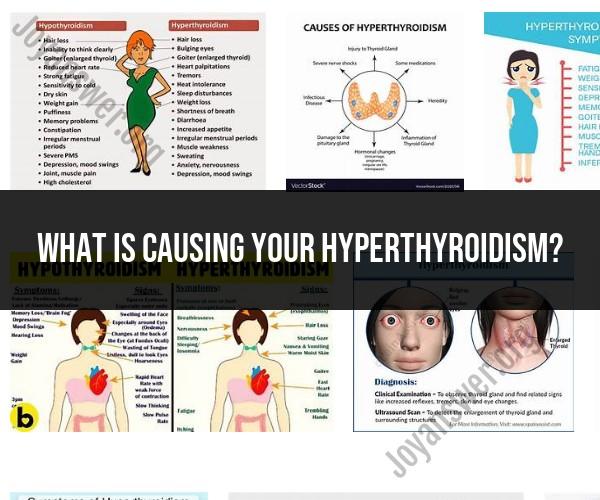What is causing your hyperthyroidism?
Hyperthyroidism is a condition in which the thyroid gland produces an excess of thyroid hormones. The most common causes of hyperthyroidism include:
Graves' Disease: This is the most frequent cause of hyperthyroidism. It is an autoimmune disorder in which the body's immune system mistakenly attacks the thyroid gland, leading to the overproduction of thyroid hormones.
Toxic Multinodular Goiter (Plummer's Disease): This condition is characterized by the presence of multiple noncancerous nodules (lumps) in the thyroid gland. These nodules can produce excess thyroid hormones independently of the body's needs.
Thyroiditis: Inflammation of the thyroid gland, often due to viral infections, can cause the release of stored thyroid hormones into the bloodstream, leading to temporary hyperthyroidism.
Excessive Iodine: Consuming excessive amounts of iodine, whether through medications or dietary sources, can lead to hyperthyroidism.
Thyroid Nodules or Tumors: Some thyroid nodules or tumors can be overactive and produce excessive thyroid hormones, leading to hyperthyroidism.
Medications: Certain medications, such as amiodarone, interferon-alpha, and lithium, can interfere with thyroid function and result in hyperthyroidism.
Hormonal Imbalances: Conditions that affect other hormones, such as the pituitary gland or the ovaries, can disrupt the normal regulation of thyroid hormones and cause hyperthyroidism.
Iodine-Induced Hyperthyroidism (Jod-Basedow Phenomenon): A sudden increase in iodine intake in individuals with underlying thyroid problems can trigger hyperthyroidism.
Ingestion of Thyroid Hormone: In rare cases, individuals may accidentally or intentionally ingest excessive amounts of thyroid hormone medications, leading to hyperthyroidism.
Genetic Factors: Some genetic factors may predispose individuals to hyperthyroidism.
It's important to note that the specific cause of hyperthyroidism can vary among individuals. If you suspect you have hyperthyroidism or have been diagnosed with the condition, it's essential to consult with a healthcare professional for a thorough evaluation, diagnosis, and appropriate treatment. Hyperthyroidism can have a range of symptoms and potential complications, so it's important to address it under the guidance of a healthcare provider.
Diagnosing Hyperthyroidism: The Underlying Causes and Triggers
Hyperthyroidism is a condition in which the thyroid gland produces too much thyroid hormone. Thyroid hormones are responsible for regulating the body's metabolism, so too much thyroid hormone can cause a variety of symptoms, including weight loss, increased heart rate, and nervousness.
The most common cause of hyperthyroidism is Graves' disease, an autoimmune disorder in which the body produces antibodies that attack the thyroid gland and cause it to overproduce thyroid hormone. Other causes of hyperthyroidism include:
- Toxic multinodular goiter, a condition in which noncancerous nodules form on the thyroid gland and overproduce thyroid hormone
- Thyroiditis, an inflammation of the thyroid gland
- Taking too much thyroid hormone medication
- Consuming too much iodine
Identifying the Culprits: What's Causing Your Hyperthyroidism?
To diagnose hyperthyroidism, your doctor will start by asking you about your symptoms and medical history. They will also perform a physical exam and order blood tests to measure your thyroid hormone levels.
If your blood tests show that you have hyperthyroidism, your doctor will need to determine the cause of your condition. This may involve additional tests, such as an ultrasound of your thyroid gland or a radioactive iodine uptake test.
Hyperthyroidism Unveiled: Understanding the Origins of the Condition
The exact cause of Graves' disease is unknown, but it is thought to be caused by a combination of genetic and environmental factors. Other causes of hyperthyroidism, such as toxic multinodular goiter and thyroiditis, are more well understood.
Toxic multinodular goiter is thought to be caused by a combination of factors, including age, iodine deficiency, and genetic predisposition. Thyroiditis can be caused by a variety of factors, including viral infections, autoimmune disorders, and certain medications.
Once the cause of your hyperthyroidism has been identified, your doctor can develop a treatment plan to manage your condition. Treatment options for hyperthyroidism include:
- Antithyroid medications: These medications block the thyroid gland from producing too much thyroid hormone.
- Radioactive iodine therapy: This treatment involves taking a radioactive iodine pill that destroys some of the thyroid gland.
- Surgery: This treatment involves removing part or all of the thyroid gland.
Hyperthyroidism is a treatable condition, but it is important to get treatment early to prevent complications. If you have any symptoms of hyperthyroidism, such as weight loss, increased heart rate, or nervousness, be sure to see your doctor for diagnosis and treatment.












